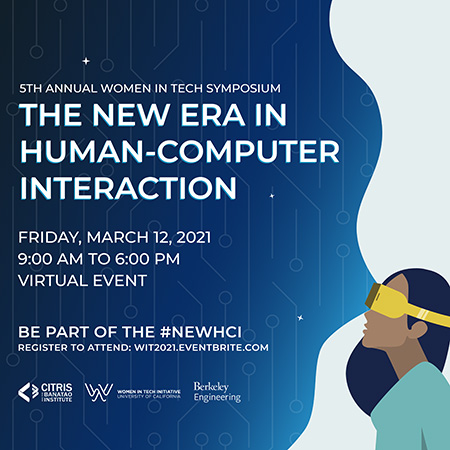Campus News
UCSC experts in human-computer interaction featured at Women in Tech Symposium
Leila Takayama will be a keynote speaker and Katherine Isbister will lead a panel on human-computer interaction and games at the annual event on March 12, 2021.



Leila Takayama, associate professor of computational media at UC Santa Cruz, will join Dean of Berkeley Engineering Tsu-Jae King Liu to kick off this year’s Women in Tech Symposium with a “fireside chat” on defining the new era of human-computer interaction.
Now in its fifth year, this annual symposium will showcase sector opportunities, current challenges, and the career paths of experts in human-computer interaction (HCI). The Fifth Annual Women in Tech Symposium on the New Era of Human Computer Interaction will take place virtually on Friday, March 12.
Human-computer interaction is a multidisciplinary field that combines new technology in cyber-physical systems with human-centered design and usability. The symposium will examine leading-edge technologies and challenges to ensuring equitable and inclusive HCI. The Center for Computational Experience in UCSC’s Baskin School of Engineering is a cosponsor of the symposium, which is organized by CITRIS and the Banatao Institute.
Katherine Isbister, the center’s director and a professor of computational media at UC Santa Cruz, will host a panel discussion on human-computer interaction and games.
“This panel brings together women with deep expertise in different areas at the intersection of games and human-computer interaction,” Isbister said. “They are all doing interesting work, and they show the surprising breadth of work being done in this area.”
The panelists include UCSC alumna Anne Sullivan, an assistant professor of digital media at Georgia Tech and director of the StoryCraft Research Lab; Rilla Khaled, an associate professor of design and computation arts at Concordia University in Montreal and director of the Technoculture, Art, and Games Research Center; and Regan Mandryk, professor of computer science at the University of Saskatchewan and a pioneer in the study of games users and their experiences.
Isbister’s research focuses on developing new methods for improving the experience of interactive technologies. She is particularly interested in designing games and other interactive experiences that heighten social and emotional connections. She is the author of several books, including Better Game Characters by Design and, more recently, How Games Move Us: Emotion by Design.
Takayama, who studies human-robot interaction, is also affiliated with the Center for Computational Experience, which brings together faculty with expertise in engineering, arts, humanities, and design. Takayama uses her background in psychology, cognitive science, and HCI to examine human encounters with new technologies. Prior to joining the faculty at UC Santa Cruz in 2016, she was a senior user experience researcher at GoogleX and was a research scientist and area manager for human-robot interaction at Willow Garage. She is a World Economic Forum Global Future Council Member and Young Global Leader.
Other speakers at the symposium include Katia Canepa Vega (UC Davis), Ankita Raturi (Purdue University), Jenna Rodriguez (CERES Imaging), Christina Harrington (DePaul University), and Uma Balakrishnan (Tesla). The event will also feature presentations of the Women in Tech Initiative’s Athena Awards. Melody Ivory, technologist at Thrivafy, will close the event with a talk titled “Sustainable Disruption: Ensuring an #InclusiveHCI Future Is Not Enough.”
Additional details and registration information for the 2021 Women In Tech Symposium is available online at wit2021.eventbrite.com.
The Women in Technology Initiative at the University of California is a program jointly launched in 2017 by CITRIS and the Banatao Institute and Berkeley Engineering to advocate for women in the tech industry and academia to be proportionately represented and equitably compensated throughout the professional ranks.
The Center for Information Technology Research in the Interest of Society (CITRIS) and the Banatao Institute drive interdisciplinary innovation for social good with faculty researchers and students from four University of California campuses—Berkeley, Davis, Merced, and Santa Cruz—along with public and private partners.